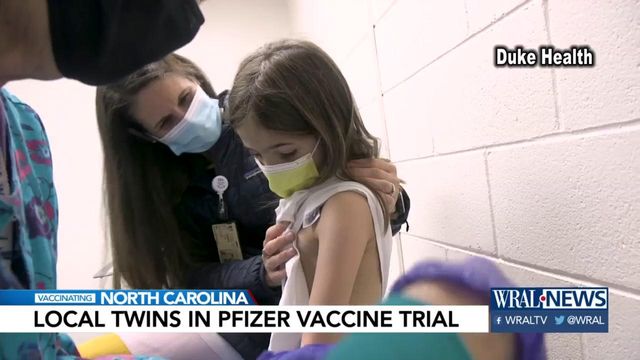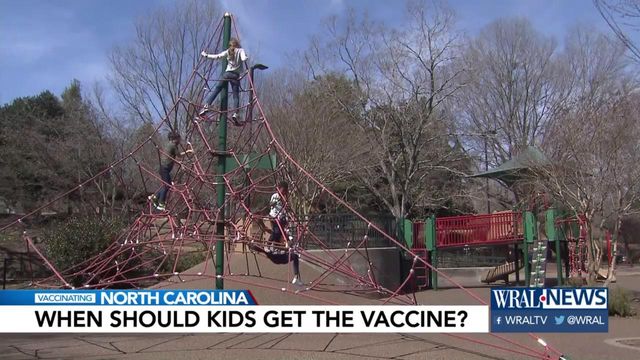Pfizer's first COVID shot for children administered at Duke
Twin 9-year-old girls, Alejandra and Marisol Gerardo, received the first Pfizer COVID-19 vaccinations in the United States at Duke Health in Durham.
Posted — UpdatedThe pharmaceutical company on Wednesday launched Phase 1 of its study into how its COVID vaccine will affect children under the age of 12.
Twin 9-year-old girls, Alejandra and Marisol Gerardo, sat in a Duke Health facility in Durham when they received the first vaccinations in the United States. Their mother Susanna Naggie, a Duke physician, said her girls were "super excited" to tell their friends about getting the first shots.
"This was a way for them to both, potentially get access to the vaccine sooner, but also to contribute and expedite the speed with which we get to a point where all kids have the option of getting vaccinated," Naggie said.
Experts believe more than 80% of Americans need to be vaccinated in order for the country to reach herd immunity, but so far drug companies have yet to develop a federally-approved shot for children.
Pfizer and Moderna have each launched trial studies.
Three hospitals in other states are also participating in the Pfizer trial, in which 48 children will receive three different dosage levels of the vaccine. Their reactions will help determine how the study proceeds to its second phase.
The study's principal investigator is Dr. Emmanuel “Chip” Walter, chief medical officer of the Duke Human Vaccine Institute. He emphasized the importance of protecting children from the novel coronavirus.
“First, children can develop serious infection and the consequences of infection include death,” Walter said.
“There have been more deaths in children during the past year than during a typical flu season. Second, being able to vaccinate children is an important component of developing herd immunity, or population-level protection, as children makeup a significant proportion of our population.”
Pfizer expects results in the second half of this year, and the company hopes to vaccinate younger children early next year.
Many parents are eager to see their children join the line, including Amy Taylor, a breast cancer survivor and mother of two.
“I definitely want the kids to get vaccinated," she said. "We get them vaccinated for polio, measles and chicken pox before they start school.”
Taylor is vaccinated and believes her teenage daughter should get the shot as well.
“She is 16, she is on the go all the time, she could be asymptomatic and I don’t want her to spread it to anybody else," Taylor explained.
But some experts are warning against vaccinating children just yet.
Dr. David Wohl with UNC says we're not there.
“The low man on the pole is going to be children," Wohl said, "We should not be vaccinating children right now, the vaccine is not approved or authorized for children. Right now they don’t need to vaccinated. The children who get infected have done really well, by and large.”
Wohl says there is value in the current trials with children. He would like to see the trial provide a couple of solutions.
“What I like to see a vaccine that will protect them [kids] from not just getting sick, but getting infected," he said.
Wohl stressed that the vast majority of children who get COVID don’t get sick. That’s why he believes a vaccinated parent will help reduce the risk.
"The best news is if we [adults] are vaccinated, if those little guys do infect us, they don’t make us sick."
When it comes to guidelines on spending time with others if you’re vaccinated and your kids are not, the CDC says if you’ve had the shot as an adult, and you want to take your unvaccinated kids to visit their grandparents, you can now safely do that.
Related Topics
• Credits
Copyright 2024 by Capitol Broadcasting Company. All rights reserved. This material may not be published, broadcast, rewritten or redistributed.






